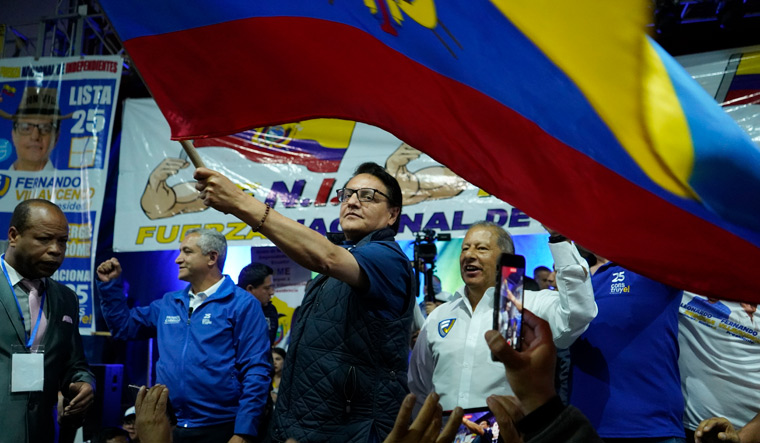Three shots in the head ended the life of Ecuadorian presidential candidate Fernando Villavicencio on Wednesday evening as assassins in two motorcycles approached the vehicle he had just entered after a political rally in the capital Quito.
Four shots rang out, Villavicencio and a policeman fell. Another shot killed one of the assassins. It is not immediately clear if the act was a political assassination though there are claims of revenge from mafia and drug cartels that had threatened him earlier in the month.
In videos and social media clips of the event, clarity remains elusive but the poignant views of blood stains among people hunched and kneeling in fear and self-protection became a metaphor for the country in shock. President Guillermo Lasso said he was indignant and dismayed by the crime. "For his memory and his fight," Lasso vowed that the assassination will not go unpunished.
The 59-year-old candidate for the movement Build Ecuador was a fierce critic of the country's former president Rafael Correa and was one of eight candidates in the special election scheduled for August 20. The election triggered when current president Lasso dissolved the legislature and cut short his own term calling for new elections in 90 days to avoid his ouster from office.
A journalist and politician, Villavicencio dedicated a huge part of his life to expose corruption in Ecuador's government. Rising from a radio host exploring Latin American culture to a stint in oil industry watchdog roles, Villavicencio clashed with the Correa administration over Petrobras contracts.
His dissent resonated widely but his accusations were deemed unfounded and libelous, and he was sentenced to 18 months in prison, which he avoided by finding refuge in indigenous communities in the country's Amazonian regions and eventually political asylum in Peru.
His began his political journey in 1995 with the founding of the Pachakutik Movement, an advocate for Ecuador's multi-ethnic identity, and his activism earned him multiple enemies among drug cartels and mafia that operate in the small country sandwiched between Peru and Colombia, two of the world's largest producers of cocaine.
Just last month and early this month, the candidate, who was under police protection as are most of the other presidential candidates, reported a threat from the drug cartel Los Choneros, a group that operates across the country and is rumoured to have infiltrated police forces.
Los Choneros ' operations span extortion, murder, assassinations, and drug trafficking. The group is said to have strong links to global criminal networks like the Sinaloa cartel, Albanian Mafia, Italian Ndrangheta, and Cosa Nostra. Its web of criminal connections is complex and powerful.
Founded as a gang by a one-time street dealer nicknamed "Chonero" in 2005, Los Choneros were soon in a violent war with rival gang "Los Queseros" starting a cycle of vengeance that wiped out "Los Queseros" and began a blood-soaked grip on organized crime and power plays. As a cartel, Los Choneros turned into a narco-terror group.
Villavicencio, a 2021 national assembly member from the Alliance for Honesty, emerged as a presidential contender for the Building Ecuador party this year, challenging the nexus between power and corruption. In his clear stance against corruption, he rallied under the banner, "It is time to be brave."
Combatting the complex interplay of threats –narcotics, illegal mining, corruption, and bribery– he proposed an ambitious National Anti-Terrorism Plan. With environmentalist Andrea González as his running mate, Villavicencio, a staunch advocate for transparency and accountability, aimed to reshape Ecuador's political landscape.
A splinter group of Los Choneros –Los Lobos– considered the second most numerous criminal organization in the country claimed credit for the assassination "as retribution for unfulfilled campaign promises after financial support."
The group released a video of a band of ISIS-like machine-gun toting, black balaclava-clad members flanking a reading of the statement that threatened other candidates who do not keep their commitments to them.
Los Lobos have thousands of members across the countries prisons and have been responsible for some of the bloodies prison battles in Ecuador, leaving hundreds dead. Villavicencio, had in some of his latest speeches, called for a prison reform to control these issues.
"It is a tragedy that our country has come to this," said attorney Juan Carlos Rodriguez, speaking to THE WEEK. Candidate Otto Sonnenholzner tweeted, "our country has gotten out of hand".
Leading candidate Yaku Pérez suspended his campaign and called other candidates to do the same, inviting for a national unity rally on Thursday. "The situation cannot continue," he said.
Polls shared by the daily El Universo, ranked Villavicencio between third to fifth place among the 8 candidates, with under 10 percent support.
The attack occurred at 18:20 local time when a burst of gunfire interrupted the post-rally euphoria. Villavicencio fell immediately without signs of life. He was transported to a near hospital, Hospital de Mujeres, where he was pronounced dead.



